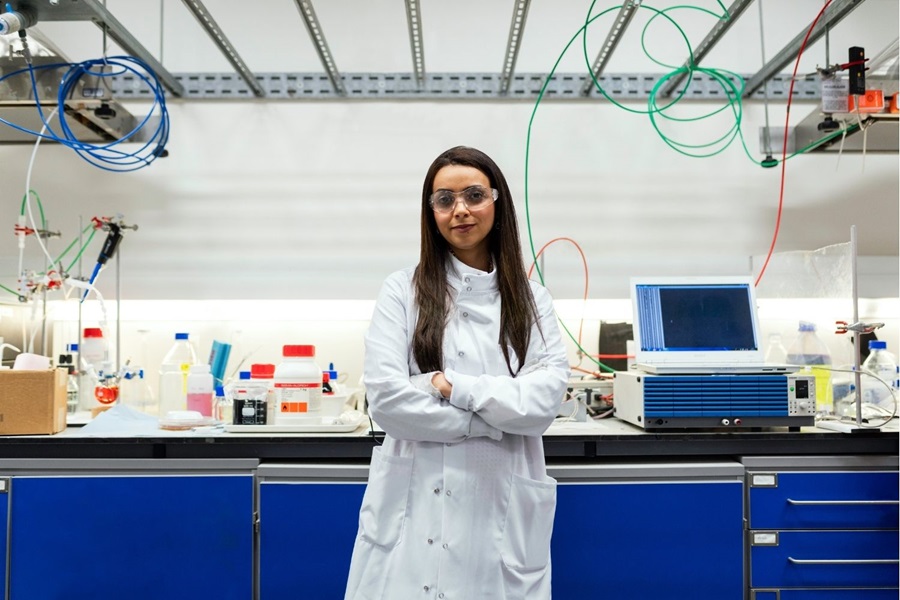Today, 11 February, is marked by the United Nations as the International Day of Women and Girls in Science. The purpose of the annual day is to achieve “full and equal access to and participation in science for women and girls”. The day focuses on the reality that tackling some of the greatest challenges on the Agenda for Sustainable Development will rely on harnessing all talent, which means getting more women working in these fields.
The COVID-19 pandemic has reminded us all of the critical role of science in our everyday lives and the health and prosperity of our societies, and the day is a timely reminder of promoting full and equal access to participation. But how does society really feel about women in positions at the highest levels of science? Do we really feel women and men are equally suited to lead?
The Reykjavik Index: Pharma and Natural Science
The Reykjavik Index for Leadership from Kantar and Women Political Leaders was created to better understand society’s perceptions of equality in leadership, revealing where significant prejudice against female leadership remains.
It measures the extent to which society is comfortable with women in leadership positions, as compared to men, and it reveals high levels of acceptance of women in positions of leadership in science.
The study assesses perceptions towards suitability to lead across twenty-three sectors and finds that two scientific sectors, Natural Sciences and Pharmaceutical & Medical Research, have some of the highest average Index scores at the G7 level – 81 and 80 out of 100 respectively, where any score less than a 100 shows an indication of prejudice against women.
The study, which has been conducted three times, has also shown very little change in Index scores at the G7 level for these sectors year-on-year, indicating that perceptions are stable:
| G7 Average score | 2018/19 | 2019/20 | 2020/21 |
| Natural Science | 82 | 80 | 81 |
| Pharmaceutical & Medical Research | 81 | 78 | 80 |
From perceptions to participation
As the scientific response to COVID-19 shapes the impact of the pandemic, there has been a spotlight on women behind the vaccine: Prof Sarah Gilbert, the woman who designed the Oxford vaccine, Özlem Türeci, Co-Founder and Chief Medical Officer of BioNTech, and World Health Organisation’s chief scientist, Soumya Swaminathan.
Whilst the public perceptions of equality in leadership found in the Reykjavik Index in these sectors are encouraging, it is not translating more widely into participation and inclusion of women in the highest positions in these sectors. Research from UNESCO shows that less than 30% of the world’s scientific researchers are women.
As for the highest levels of advisory and decision making in science in response to the pandemic, in the UK, 17 of the approximately 55 members of the government’s Scientific Advisory Group for Emergencies (SAGE) are women, but in Italy, where COVID-19 had an early and devastating impact, leading female scientists demanded that they be included in the national response. Initially, there were no women on Italy’s 20-member technical scientific committee Comitato Tecnico Scientifico (CTS) – a group of experts advising the government during the coronavirus outbreak. However, now six women have joined the committee. In the US, only two women are on The White House Coronavirus Task Force of 27 people.
Share of voice
Female voices have also been remarkably absent in news reporting of the pandemic, according research from the International Women’s Media Foundation, with a substantial bias towards men’s perspectives in both news gathering and news coverage of the pandemic, spanning across all regions. Within scientific expert commentary in global news coverage, men were quoted between 2.9 (UK) and 5.1 (India) times more frequently than women in COVID-19/coronavirus stories in the six analysed countries. 60% of medical doctors quoted were men, in comparison to 21% women, and in academia 75% were men, with 22% of quotes coming from women.
The power of attitudes
Our research looked at perceived suitability of women in leadership positions from a sector perspective and found that Natural Sciences and Pharmaceutical and Medical Research are those with the highest average G7 Index scores.
Both women and men continue to demonstrate some prejudice against women in these subsectors. The average G7 score for Pharmaceutical and Medical Research is 76 for men, with women scoring 83. For Natural Sciences, scores for women are 84 and for men 78.
This dissonance in scores indicates that any efforts to counter prejudice towards women in leadership in these sectors will need to account for the higher amounts of prejudice demonstrated by men.


